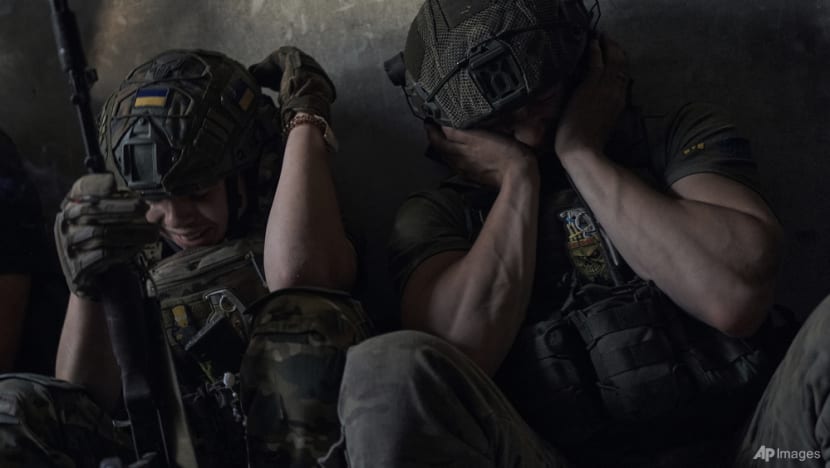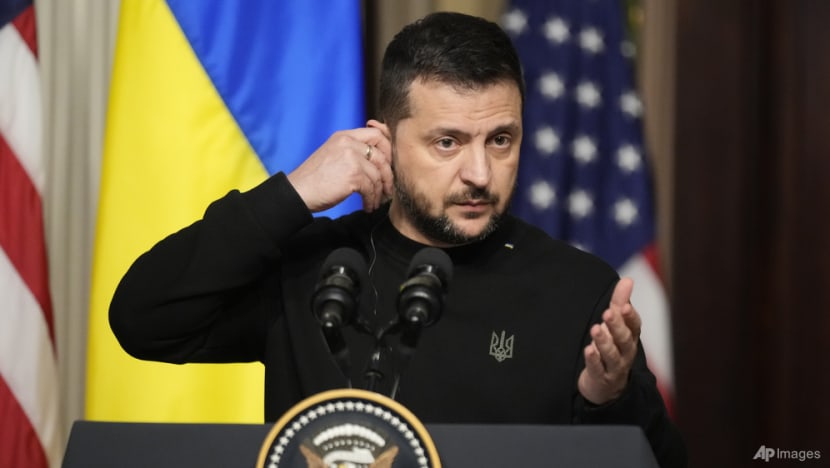Commentary: As war drags on, Ukrainian leaders play the blame game
It’s not surprising that political tensions are playing out in Ukraine amid frustration over progress in the war, says this foreign policy analyst.

Ukrainian soldiers cover their ears to protect from the Russian tank shelling in a shelter on the frontline in the Zaporizhzhia region, Ukraine, on Jul 2, 2023. (AP Photo/Libkos)

This audio is generated by an AI tool.
BELGRADE: Ukraine’s war efforts are at risk of international sabotage. If, in 2024, Kyiv does not continue to receive military and financial aid from the United States and its Western allies, it could not only lose more territory to Russia, but also face a political crisis at home, which is the last thing the war-torn nation needs.
The decision by US Republicans to block an emergency spending bill to fund support for the war in Ukraine already has had an impact on the situation in Donbas in the east of Ukraine, where Russian forces made small but significant tactical gains.
Meantime, as a result of Ukraine’s failed counteroffensive, launched in June, political tensions between Ukrainian President Volodymyr Zelenskyy and the country’s commander-in-chief Valeriy Zaluzhny have become increasingly apparent. The two most recently appeared at odds over whether the war stands at a “stalemate”.
A blame game between Zelenskyy and Zaluzhny has played out over months, as Ukrainian forces have found their progress stymied, even though internationally the finger has been pointed at the West for slow weapons deliveries.

Former Zelenskyy adviser Oleksiy Arestovych has also accused the West of “not providing the military support it promised to Kyiv”. But tellingly, Arestovych has criticised the Ukrainian leadership, too.
Such political tension isn’t surprising, given the lack of significant progress over the past six months, even as Zelenskyy insists that a slowdown in operations against Russian forces is due to the onset of winter.
NEIGHBOURING EUROPEAN COUNTRIES ARE UNDERMINING KYIV
However, reports also suggest that Ukrainian military is facing ammunition shortages. At issue isn’t only US support. Neighbouring European countries also seem to be (indirectly) undermining Kyiv’s position.
Poland, a North Atlantic Treaty Organization (NATO) member, has delivered significant military, financial and humanitarian aid worth around €4.3 billion (US$4.7 billion) to Ukraine since 2022, but in September this year halted weapons supplies amid a diplomatic dispute over Kyiv’s grain exports.
Polish truck drivers blocked access roads to border crossings in November, arguing that their livelihoods are at stake after the European Union relaxed some transport rules and Ukrainian truckers undercut their business.
The Polish drivers were soon joined by their Slovak colleagues on Dec 1, while Slovakia’s recently appointed Prime Minister Robert Fico has declared that he will terminate his country’s military support to Kyiv.
Neighbouring Hungary has also insisted that Budapest will never deliver weapons to Ukraine, with Foreign Minister Peter Szijjarto claiming that the “more weapons delivered, the longer the war will take”. Hungary recently vetoed the European Union’s plan to commit €50 billion to support Kyiv in its war against Russia.
Another problem for Ukraine is that Western public opinion is no longer as engaged by the war as it was in 2022. Attention has been directed to the conflict between Israel and Hamas, as well as political contests closer to home - the upcoming presidential election in the United States an obvious example.
UKRAINE WAR COULD BE OVERSHADOWED
The Kremlin sees opportunity in the prospect that the Ukraine war could be overshadowed, and hopes to retake the initiative in the battlefield, seize more territory in Donbas, as well as regions in southeastern Ukraine.
Indeed, Russian President Vladimir Putin’s claim in recent days that the Ukrainian port city Odesa is a Russian city, as well as the whole southeast of Ukraine being historically Russian territories, indicates that Moscow is not giving up on its ambitions.
Zelenskyy, on the other hand, warns that his country cannot win the war without foreign support, and reportedly fears that the West could abandon Kyiv. That Ukraine got the green light to start talks on joining the European Union suggests that concern about fading political support could be overblown.
But what Ukraine desperately needs is military aid. Without it, Kyiv could lose more territory to Russia.
And what happens on the ground in Ukraine will also play out in local politics. It is uncertain whether the country will hold a presidential election, with Zelenskyy’s mandate due to expire in March 2024. Zelenskyy has said there cannot be elections as long as the country is at war and under martial law, but the question seems far from settled.
Zelenskyy’s former ally Arestovych has already announced his candidacy for the Ukrainian presidency, although having fallen from grace with the country’s political elite, also describes himself as a “self-exiled opposition politician” and is currently based in the United States.
But with a potential Russian offensive in the spring, who can say what terrible twists this awful real-life Game Of Thrones could hold for the war-torn country next?
Nikola Mikovic is a freelance journalist, researcher and analyst based in Serbia. This commentary first appeared on Lowy Institute's blog, The Interpreter.















